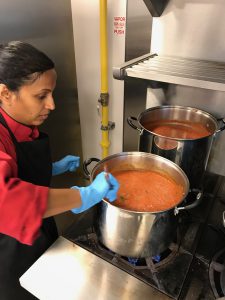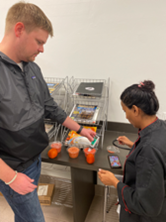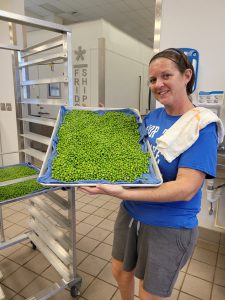IMMOKALEE, Fla. — Reshma Tannassee’s sauces sell like hotcakes. She started the business on her own, and now she has 13 employees and hopes to have about 300 in a few years.
With certain foods, you can’t just sell your product from home. You need a license. That’s where Tannassee got help from Matt Krug, a state specialized agent in food science for UF/IFAS Extension, who’s based at the Southwest Florida Research and Education Center.
Originally, Tannassee had a Cottage Food license, which allowed her to mix spices and make bread at home. She wanted to make hot sauce; however, the cottage food license doesn’t cover that.

As fortune would have it, her sister-in-law called her one morning after seeing an announcement about the grand opening of the Culinary Accelerator @ Immokalee on TV news.
Enter Krug, who teaches entrepreneurial chefs at the Accelerator. There, he guides them through the regulatory hoops so they can obtain necessary licenses to operate and expand their businesses.
Krug was hired by UF/IFAS in 2017 and has provided guidance to the facility ever since.
“Initially, I was helping the project team make decisions on equipment purchases and hiring employees and other things while the facility was built,” he said. “Since it opened in Spring 2018, I have provided guidance to facility staff and many of the food entrepreneurs who work in the facility on the topics of food safety and regulations.”
Tannassee’s experience at the Accelerator and, in particular with Krug, has been eye-opening. “I didn’t know I needed to do all this. It was so hard.” It took Tannassee eight months to obtain the necessary license to make and sell her sauces.
Krug tweaked the ingredients in Tannassee’s sauces so she could attain the license she needed. The trick was in their pH level. Getting the correct pH would allow Tannassee to pass canning regulations. Krug found the pH level in the sauce was too high, due to ingredients such as cucumbers, so they modified the recipe to lower it.
Tannassee now makes 170 products, some sold under the brand name, “Carina’s,” and she conducts business with J.W. Marriott Marco Island as well as Seed to Table to sell them.

“I enjoy the excitement I see on their faces when they successfully obtain the necessary licensing to operate their businesses,” Krug said. “It’s also fun to see the businesses grow, and I get satisfaction when I see their products n the shelves at the grocery store.”
He credits Tannassee for creating jobs for people in Southwest Florida.
Tannassee and her business partners broke ground this month on a 10,000-square-foot facility in Ave Maria, which will take two years to build. She’s hiring 300 people to work around the clock on her sauces. The top jobs will pay about $30 an hour.
She gives a lot of credit to Krug. “He’s my genius. Without Matt, I don’t know if we could have figured this out.”
By the same token Krug lauds Tannassee. “There’s a lot of demand for her product,” he said. “She’s worked really hard. She’s really growing her company.”
Krug said Tannassee was one of the first clients to meet with him, back in 2018. They still meet to discuss her food safety plans and test that all-important pH content in her sauces.
As part of his job as a state specialized extension agent, Krug conducts food-safety workshops statewide, but he’s closest to the clients at the Accelerator @ Immokalee. He is there a couple of times per week, a result of client requests.
With every client, Krug asks: How are you trying to sell your product? A few follow-up questions might include whether they want to pack it for a grocery store, sell it at a farmer’s market, restaurants?
“The answer to those questions will make a huge difference on how they navigate regulations and move their businesses forward,” Krug said.
Another success story from the Accelerator: The K9 Kitchen
Kendra Locke and Corene Petitpren wanted to sell their dog food and treats. They looked all over and couldn’t find the right facility to sell and manufacture. They knew they needed to work in a commercial/culinary kitchen, and finding the perfect kitchen took time. They eventually found the Culinary Accelerator.

Locke and Petitpren started at the K9 Kitchen at the Accelerator in late 2019. After a rigorous process of research, trial and error with licensing and other assorted regulations, they made first sale several months later.
K9 Kitchen makes three kinds of meals: Gobble Me Gone, which is a turkey and quinoa; Beef-A-Licious which is beef & brown rice and Kickin’ Chicken, which their grain-free option. They also make two kinds of treats — a peanut butter cookie and a sweet tater treat. And they make six flavors of pup-sicles, which are frozen treats.
They sell their products in various places. For example, they have an e-commerce store on their website. They’re also in several pet stores, an animal hospital and a grocery store. They also sell at two farmers markets on Saturdays.
They owe much of their success to their start at the Accelerator, including the all-important commodity: information and a facility.
“It has all been so helpful and very beneficial to our business. Also, by working at the accelerator, we have been able to network with other businesses which is great because they share ideas with us and vice-versa,” Locke said.
For more information, visit the Culinary Accelerator website or call 239-252-2227.
-30-
The mission of the University of Florida Institute of Food and Agricultural Sciences (UF/IFAS) is to develop knowledge relevant to agricultural, human and natural resources and to make that knowledge available to sustain and enhance the quality of human life. With more than a dozen research facilities, 67 county Extension offices, and award-winning students and faculty in the UF College of Agricultural and Life Sciences, UF/IFAS brings science-based solutions to the state’s agricultural and natural resources industries, and all Florida residents.
ifas.ufl.edu | @UF_IFAS
 2
2
